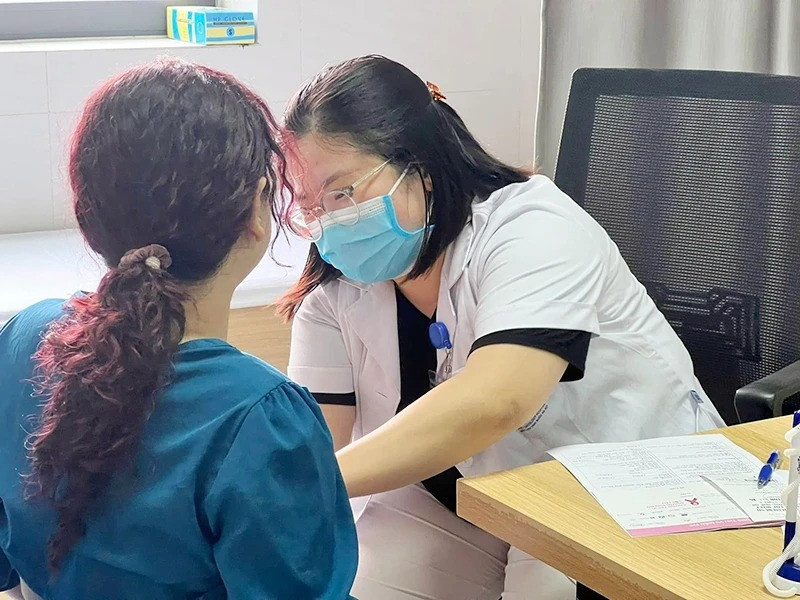Additional benefits for health insurance participants
The Ministry of Health is coordinating with relevant ministries and branches to amend the Law on Health Insurance in the direction of supplementing policies and benefits for health insurance participants.
The new policies aim at universal health insurance in all three aspects: the proportion of the population participating in health insurance, the scope of services enjoyed, and the level of financial protection of health service users.

Propose additional health insurance package
According to Dr. Nguyen Khanh Phuong, Deputy Director of the Institute for Health Strategy and Policy (Ministry of Health), in order to achieve the goal of universal health insurance coverage, it is necessary to mobilize sufficient financial resources to meet people's health care needs; at the same time, reduce direct out-of-pocket spending, limit financial barriers in accessing health care services. On the other hand, increase access to health services, including on-demand, high-tech services (with high co-payment levels)...
On that basis, the Ministry of Health and relevant authorities propose a supplementary health insurance package to increase benefits for health insurance participants.
Ms. Tran Thi Trang, Acting Director of the Department of Health Insurance (Ministry of Health) said that supplementing the health insurance policy is one of the important points in Resolution No. 20-NQ/TW on strengthening the protection, care and improvement of people's health in the new situation; ensuring progress and international integration in policy making. The purpose of building a supplementary health insurance package is to supplement a health benefit package beyond the scope of payment of compulsory health insurance (as currently applied), increase benefits, reduce out-of-pocket expenses of patients; so that patients can access better services, and can even choose service providers. The scope of payment of the package does not overlap with the scope of benefits and benefit levels of compulsory health insurance. The State encourages organizations and individuals to purchase, support the purchase of supplementary health insurance, and encourages organizations to implement supplementary health insurance according to the non-profit principle.
This supplementary health insurance package is voluntary, people participate on the basis of participating in compulsory health insurance. The supplementary health insurance package will cover additional value such as co-payments, additional benefits that patients need, and additional services compared to the services currently provided by health insurance.
Regarding the premium for supplementary health insurance, it will currently be determined by the insurance business unit. However, the State will stipulate the principles for establishing premiums to ensure the rights of patients, and the scope of payment must not overlap with compulsory health insurance.
Some additional health insurance package benefits are of an advanced nature such as the right to use drugs, medical services on demand, high-cost drugs not covered by compulsory health insurance, health insurance users can choose their own medical facilities... The authorities will propose a clear legal mechanism to monitor the implementation of additional health insurance.
However, this is a new policy related to the rights of health insurance participants, so experts in the field of health finance and relevant state management agencies believe that there need to be adjustments at the legal level to synchronize with other related laws.
Notably, this is a voluntary health insurance package for people who have already participated in compulsory health insurance, so the regulations must be detailed and clear to ensure the rights of participants regarding the scope of payment and the non-duplication of benefits.
Currently, the amount of co-payments by patients accounts for about 9% of the total cost of medical examination and treatment under health insurance. It is expected that out-of-pocket expenses for outpatient examination and treatment will decrease by 25% when applying voluntary health insurance and the reduction for inpatient examination and treatment will be 41%. Thus, the total reduction in out-of-pocket expenses will be about 20 to 31%.
In addition, supplementary health insurance also helps increase access to health services, including on-demand, high-tech services (with large co-payment levels), mobilizing additional financial resources for health care...
Health insurance covers the cost of screening for some serious diseases.
According to current regulations, screening and early treatment services for diseases, although there is much evidence of effectiveness and cost savings, are not covered by the Health Insurance Fund. Therefore, adjusting and supplementing the scope of benefits for health insurance participants is necessary and in line with the direction of "Expanding the scope of benefits for health insurance participants".
However, the extent of expansion needs to be comprehensively assessed in the context of increasing demand but limited financial resources of the fund. In particular, the consideration of expanding benefits on diagnostic screening services and early treatment of some diseases needs to be specifically and accurately researched and evaluated to select cost-effective services to ensure the rights of health insurance participants while being suitable for the payment capacity of the Health Insurance Fund.
Based on initial research results, impact assessment and experience in a number of countries, the Ministry of Health proposes the scope of health insurance benefits for early diagnosis and treatment of a number of diseases in the Draft Law on Health Insurance Amendment.
Accordingly, the Health Insurance Fund will pay for examination and screening for early detection of disease groups such as cervical cancer, breast cancer, hypertension, diabetes, and hepatitis C. The expansion of people's health insurance benefits is to synchronize policies with the Law on Medical Examination and Treatment, which will take effect from the beginning of 2024, as well as the people's health care strategy.
The Ministry of Health said that currently, only purely therapeutic medical services are covered by health insurance, however, early screening and diagnosis is an important part of successful treatment. When the disease is detected early, treatment becomes simpler, reducing treatment costs, avoiding long-term hospitalization or expensive medical services, and reducing mortality. This helps reduce the financial burden on individuals, the health system, and the Health Insurance Fund.
Master Le Van Phuc, Head of the Health Insurance Policy Implementation Department (Vietnam Social Insurance), said that the proposal of five groups of diseases covered by health insurance in initial medical examination and treatment will help screen for risks; if the disease becomes severe, it will help reduce the burden of treatment costs and time. In terms of health, if detected early, the patient will be treated early and save costs in terms of budget, time and mental damage. Regulations on screening, prevention, consultation and early diagnosis will have conditions and a specific roadmap. However, this is only a plan, a comprehensive and specific assessment is needed, especially an assessment of the impact and payment capacity of the fund.





